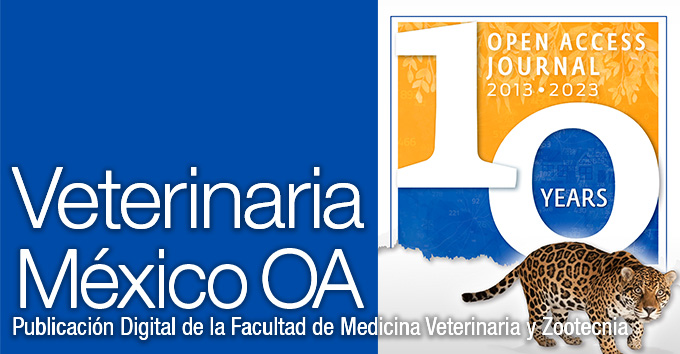Proteins from Mycobacterium bovis culture filtrate promote apoptosis independently of caspase activation in bovine macrophages
Main Article Content
Abstract
Apoptosis is a normally occurring process characterized by morphological changes in the cell. The species of the Mycobacterium tuberculosis complex induce apoptosis. In bovines, Mycobacterium bovis and its protein extracts induce apoptosis independently of caspase activation. However, the identity of the proteins in the extracts is unknown. In this study, we used size-exclusion chromatography to separate protein fractions from the culture filtrate. We obtained protein fractions that induced DNA fragmentation in bovine macrophages independently of caspase-3 activation. Liquid chromatography-mass spectrometry (LC-MS) identified three candidates responsible for the biological activity: MPB70, MPB83, and 60 kDa chaperonin.
Article Details
References
Elmore S. Apoptosis: a review of programmed cell death. Toxicologic Pathology. 2007;35(4):495-516. doi: 10.1080/01926230701320337.
Galluzzi L, Vitale I. Molecular mechanisms of cell death: recommendations of the Nomenclature Committee on Cell Death 2018. Cell Death & Differenciation. 2018;25:486-541. doi: 10.1038/s41418-017-0012-4.
Cascales Angosto M. Bases moleculares de la apoptosis. Anales de la Real Academia Nacional de Farmacia. 2003;69(1):36-64.
Dulberger CL, Rubin EJ, Boutte CC. The mycobacterial cell envelope–a moving target. Nature Reviews Microbiology. 2020;18:47-59. doi: 10.1038/s41579-019- 0273-7.
Waters WR, Hope JC, Hamilton CA, Palmer MV, Mcnair J, Skuce RA, et al. Immunopathogenesis of Mycobacterium bovis infection of cattle. In: H. Mukundan, MA Chambers, WR Waters, MH Larsen, editors. Tuberculosis, Leprosy and Mycobacterial Diseases of Man and Animals: The many Hosts of Mycobacteria. Oxfordshire, UK, Boston, MA: MACABI; 2015. pp. 136-167.
Gutierrez-Pabello JA, Mcmurray DN, Admas LG. Upregulation of thymosin β-10 by Mycobacterium bovis infection of bovine macrophages is associated with apoptosis. Infection and Immunity. 2002;70(4):2121-2127. doi: 10.1128/IAI.70.4.2121–2127.2002.
Liu L, Liu J, Niu G, Xu Q, Chen Q. Mycobacterium tuberculosis 19 kDa lipoprotein induces toll-like receptor 2-dependent peroxisome proliferator-activated receptor γ expression and promotes inflammatory responser in human macrophages. Molecular Medicine Reports. 2015;11(4):2921-2926. doi: 10.3892/mmr.2014.3070.
Sánchez A, Espinosa P, García T, Mancilla R. The 19 kDa Mycobacterium tuberculosis lipoprotein (LpqH) induces macrophage apoptosis through extrinsic and intrinsic pathways: a role for the mithochondrial apoptosis–inducing factor. Clinical and Developmental Immunology. 2012:1-11. doi: 10.1155/2012/950503.
Derrick SC, Morris SL. The ESAT6 protein of Mycobacterium tuberculosis induces apoptosis of macrophages by activating caspase expression. Cellular Microbiology. 2007;9(6):1547-1555. doi: 10.1111/j.1462-5822.2007.00892.x.
Sanchez A, Espinosa P, Esparza MA, Colon M, Bernal G, Mancilla R. Mycobacterium tuberculosis 38-kDa lipoprotein is apoptogenic for human monocyte-derived macrophages. Scandinavian Journal of Immunology. 2009;69(1):20-28. doi: 10.1111/j.1365-3083.2008.02193.x.
Basu S, Pathak SK, Banerjee A, Pathak S, Bhattacharyya A, Yang Z, et al. Execution of macrophage apoptosis by PE_PGRS33 of Mycobacterium tuberculosis in mediated by toll-like receptor 2- dependent release of tumor necrosis factor-α. The Journal of Biological Chemestry. 2006;282(2):1039-1050. doi: 10.1074/jbc.M604379200.
Wang L, Zuo M, Chen H, Liu S, Wu X, Cui Z, et al. Mycobacterium tuberculosis lipoprotein MPT83 induces apoptosis of infected macrophages by activating the TLR2/p38/COX-2 signaling pathway. The Journal of Immunology. 2017;198(12):4772-780. doi: 10.4049/jimmunol.1700030.
Aguilo JI, Alonso H, Uranga S, Marinova D, Arbués A, de Martino A, et al. ESX-1- induced apoptosis in involved in cell-to-cell spread of Mycobacterium tuberculosis. Cellular Microbiology. 2013;15(12):1994-2005. doi: 10.1111/CMI.12169.
Vega-Manriquez X, Lopez-Vidal Y, Moran J, Adams LG, Gutiérrez-Pabello JA. Apoptosis-inducing factor participation in bovine macrophage Mycobacterium bovis-induced caspase-independent cell death. Infecction and Immunity. 2007;75(3):1223-1228. doi: 10.1128/IAI.01047-06.
Rivera Maciel A, Flores Villalva S, Jiménez Vázquez I, Catalan Bárcenas O, Espitia Pinzón C, Moran J, et al. Mycobacterium tuberculosis and Mycobacterium bovis derived proteins induced caspase-independent apoptosis in bovine macrophages. Veterinaria México OA. 2019;6(1):1-12. doi: 10.22201/fmvz.24486760e.2019.1.560.
Benítez-Guzmán A, Arriaga-Pizano L, Morán J, Gutiérrez-Pabello JA. Endonuclease G takes part in AIF-mediated caspase-independent apoptosis in Mycobacterium bovis-infected bovine macrophages. Veterinary Research. 2018;49:69. doi: 10.1186/s13567-018-0567-1.
Nagai S, Wiker HG, Harboe M, Kinomoto M. Isolation and partial characterization of major protein antigens in the culture fluid of Mycobacterium tuberculosis. 1991;59(1):372-382. doi: 0019-9567/91/010372-11$02.00.
Nagai S, Matsumoto J, Nagasuga T. Specific skin-reactive protein from culture filtrate of Mycobacterium bovis BCG. Infect Immun. 1981;31(3):1152-1160. doi: 0019-9567/81/031152-09$02.00/0.
Harboe M, Oettinger T, Wiker HG, Rosenkrands I, Andersen P. Evidence for occurrence of the ESAT-6 protein in Mycobacterium tuberculosis and virulent Mycobacterium bovis and for its absence in Mycobacterium bovis BCG. Infection and Immunity. 1996;64(1):16-22. doi: 0019-9567/96/$04.00+0.
Harboe M, Wiker HG, Ulvund G, Lund-Pedersen B, Andersen AB, Hewinson RG, et al. MPB70 and MPB83 as indicators of protein localization in mycobacterial cells. Infection and Immunity. 1998;66(1):289-296. doi: 0019-9567/98/$04.00+0.
Rosenkrands I, King A, Weldingh K, Moniatte M, Moertz E, Andersen P. Towards the proteome of Mycobacterium tuberculosis. Electrophoresis. 2000;21:3740-3756. doi: 0173-0835/00/1717-3740 $17.50+.50/0.
Sabio Y García J, Bigi MM, Klepp LI, García EA, Blanco FC, Bigi F. Does Mycobacterium bovis persist in cattle in a non-replicative latent state as Mycobacterium tuberculosis in human beings? Veterinary Microbiology. 2020;247. doi: 10.1016/j.vetmic.2020.108758.
Assal N, Rennie B, Walrond L, Cyr T, Rohonczy L, Lin M. Proteome characterization of the culture supernatant of Mycobacterium bovis in different growth stages. Biochemestry and Biophysics Reports. 2021;28:1-4. doi: 10.1016/j.vetmic.2020.108758.
Rojas M, Barrera LF, Puzo G, Garcia LF. Differential induction of apoptosis by virulent Mycobacterium tuberculosis in resistant and susceptible murine macrophages: role of nitric oxide and mycobacterial products. The Journal of Immunology. 1997;159(3):1352-1361. doi: 159:1352-1361.
Albrethsen J, Agner J, Piersma SR, Højrup P, Pham TV, Weldingh K, et al. Proteomic profiling of Mycobacterium tuberculosis identifies nutrient-starvation- responsive toxin-antitoxin systems. Molecular & Cellular Proteomics. 2013;12(5):1180-1191. doi: 10.1074/MCP.M112.018846.
Forrellad MA, Klepp LI, Gioffré A, Sabio y García J, Morbidoni HR, Santangelo M de la P, et al. Virulence factors of the Mycobacterium tuberculosis complex. Virulence. 2013;4(1):3-66. doi: 10.4161/viru.22329.
Roperto S, Varano M, Russo V, Lucà R, Cagiola M, Gaspari M, et al. Proteomic analysis of protein purified derivative of Mycobacterium bovis. Journal of Translational Medicine. 2017;15:68. doi: 10.1186/s12967-017-1172-1.
Alito A, McNair J, Girvin RM, Zumarraga M, Bigi F, Pollock JM, et al. Identification of Mycobacterium bovis antigens by analysis of bovine T-cell responses after infection with a virulent strain. Brazilian Journal of Medical and Biological Research. 2003;36(11):1523-1531. doi: 10.1590/S0100-879X2003001100011.
Amaral EP, Costa DL, Namasivayam S, Riteau N, Kamenyeva O, Mittereder L, et al. A major role for ferroptosis in Mycobacterium tuberculosis–induced cell death and tissue necrosis. Journal of Experimental Medicine. 2019;216(3):556-70. doi: 10.1084/jem.20181776.
Bai X, Kinney WH, Su WL, Bai A, Ovrutsky AR, Honda JR, et al. Caspase-3-independent apoptotic pathways contribute to interleukin-32γ-mediated control of Mycobacterium tuberculosis infection in THP-1 cells. BioMedCentral Microbiology. 2015;15(1):1-9. doi: 10.1186/s12866-015-0366-z.
Cui Y, Zhao D, Sreevatsan S, Liu C, Yang W, Song Z, et al. Mycobacterium bovis Induces endoplasmic reticulum stress mediated-apoptosis by activating IRF3 in a murine macrophage cell line. Frontiers in Cellular and Infection Microbiology. 2016;6:1-12. doi: 10.3389/fcimb.2016.00182/full.
Yanti B, Mulyadi M, Amin M, Harapan H, Mertaniasih NM, Soetjipto S. The role of Mycobacterium tuberculosis complex species on apoptosis and necroptosis state of macrophages derived from active pulmonary tuberculosis patients. BioMed Central Research Notes. 2020;13:415. doi: 10.1186/s13104-020-05256- 2.
Mohareer K, Asalla S, Banerjee S. Cell death at the cross roads of host-pathogen interaction in Mycobacterium tuberculosis infection. Tuberculosis. 2018;113:99-121. doi: 10.1016/j.tube.2018.09.007.
Michell SL, Whelan AO, Wheeler PR, Panico M, Easton RL, Etienne AT, et al. The MPB83 antigen from Mycobacterium bovis contains O-linked mannose and (1→ 3)-mannobiose moieties. The Journal of Biological Chemistry. 2003;278(18):16423-16432. doi: 10.1074/jbc.M207959200.
Wiker HG. MPB70 and MPB83-Major antigens of Mycobacterium bovis. Scandinavian Journal of Immunology. 2009;69(6):492-499. doi: 10.1111/ J.1365-3083.2009.02256.X.
Ju-Ock N, Jung-Eun K, Ha-Won J. Patent Application Publication. Pub. No.: US 2008/027.4955A1. 2008;1(19).
Colaco CA, Macdougall A. Mycobacterial chaperonins: the tail wags the dog. FEMS Microbiology Letters. 2014;350:20-24. doi: 10.1111/1574-6968.12276.
Qamra R, Mande SC. Crystal structure of the 65-kilodalton heat shock protein, chaperonin 60.2 of Mycobacterium tuberculosis. Journal of Bacteriology. 2004;186(23):8105-8113. doi: 10.1128/JB.186.23.8105-8113.2004.
Ying Yua, Lin Zhanga, Ying Chenb, Yuan Lia, Zhenzhong Wangc, Ganwu Lia, d, Gang Wanga JX. GroEL protein (heat shock protein 60) of Mycoplasma gallisepticum induces apoptosis in host cells by interacting with annexin A2. Infection and Immunity. 2019;87(9). doi: 10.1128/IAI.00248-19.
Ikwegbue PC, Masamba P, Oyinloye BE, Kappo AP. Roles of heat shock proteins in apoptosis, oxidative stress, human inflammatory diseases, and cancer. Pharmaceuticals. 2018;11(1):1-18. doi: 10.3390/ph11010002.
License

Veterinaria México OA by Facultad de Medicina Veterinaria y Zootecnia - Universidad Nacional Autónoma de México is licensed under a Creative Commons Attribution 4.0 International Licence.
Based on a work at http://www.revistas.unam.mx
- All articles in Veterinaria México OA re published under the Creative Commons Attribution 4.0 Unported (CC-BY 4.0). With this license, authors retain copyright but allow any user to share, copy, distribute, transmit, adapt and make commercial use of the work, without needing to provide additional permission as long as appropriate attribution is made to the original author or source.
- By using this license, all Veterinaria México OAarticles meet or exceed all funder and institutional requirements for being considered Open Access.
- Authors cannot use copyrighted material within their article unless that material has also been made available under a similarly liberal license.



